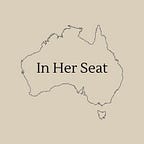Louise Pratt: Inclusion and rights
“I also have a pretty distinct personality; I am known for speaking up when it counts.”
Almost 100 years ago, Edith Cowan became the first woman elected to an Australian parliament, in March 1921.
In Her Seat is asking as many currently serving female politicians as we can how they view gender equality, politics and their impact.
This is a non-partisan project that is soliciting contributions from women in all parties, or none at all, in every parliament.
Louise Pratt is a Senator for Western Australia.
First elected to the Senate in 2008, she was defeated in 2013 and returned in 2016.
From 2001–07 she served in the Western Australian Parliament from 2001–07, where she was the first open lesiban elected to an Australian parliament the youngest woman in that parliament.
Upon election in 2001 Louise led reforms for LGBTIQ people at the state level. Most of her proposals were put into law through the landmark Acts Amendment (Lesbian and Gay Law Reform) Act 2002.
In Federal Parliament Louise has maintained her passion for LGBTIQ policy issues working collaboratively across the aisle to achieve reforms. She has also worked on a range of social inclusion, environment and employment issues.
Louise is currently the Shadow Assistant Minister for Employment Services and Manufacturing.
What does gender equality mean to you?
Gender equality means women always having a place at the table where decisions are made, be that at home, in the Parliament or in the boardroom.
It also means working to address the real inequalities that continue to exist today in the workplace, economy, community and at home.
I feel strongly that gender equality should mean being able to express yourself, your needs and values. This should not have to come with a gendered censoring and doublethink that is all too often experienced by women and girls.
I also recognise that the right to this expression is also for men, masculinity should embrace caring for family and expressing a soft caring side
Gender equality means no one being in a box regardless of their sex or gender, it means never denigrating someone because of their sex or gender characteristics.
Which female politicians have inspired or encouraged you?
Julia Gillard has always been a great inspiration to me not only in her position as the first on thus far only female prime minister but also in her poise and passion in dealing with the sexist fall out which that seems to inevitably follow all women in positions of power.
I am also inspired by Carmen Lawrence for the same reasons.
Julia’s decision to ignore the “witch” comments and rise above then to spectacularly skewer the opposition on those comments in the game-changing misogyny speech is incredible.
What inspired you to serve your community?
Anyone who sees inequities in their community and works towards a solution inspires me.
For me it’s always been that way. Other people’s passion for justice was infectious and greatly motivating. I was given opportunity and support from a young age by incredible people around me.
I also consider it the privilege and duty of those serving their community to pass that passion and opportunity onto others.
What are the most important contributions you are making in Parliament?
I bring to the parliament not only the knowledge and wisdom of almost 20 years in public office but on a more basic level I contribute a level of knowledge that comes from being a gay woman and mother.
My links with feminist and LGBTIQ communities mean that I am keenly attuned to how different groups of people can be affected in different ways by the same decision.
I also have a pretty distinct personality; I am known for speaking up when it counts.
What is next for gender equality in politics?
There is so much!
There is still plenty of work to be done in the sector of women’s superannuation. We are in a situation at the moment where women have not had the kind of occupations which paid superannuation leaving half of all women aged 45–59 with less than $8,000 in their account.
This also points to women having access to a greater diversity of roles in our economy, which is by global standards still very segregated.
We also need to turn our attention to Trans and general LGBTIQ rights which have been ignored and denied in this country for too long.
These issues are intrinsically linked to gender equality as they relate very much to overcoming perceptions that men and women have defined roles and qualities.
In Her Seat interviews can be accessed here
